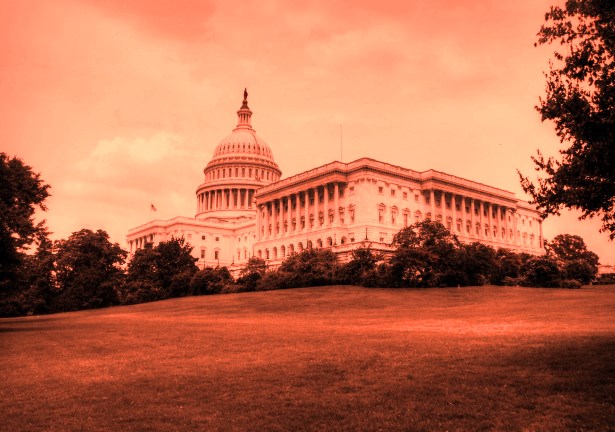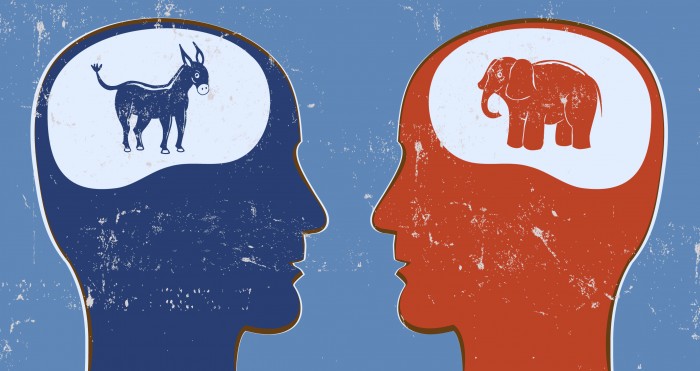Conformist. Obedient. Rule-oriented. Rigid. Prudish. Dogmatic. Repressed. None of these are words you would use to describe President Donald Trump. Yet they are among the defining traits of individuals who score highly on the right wing authoritarian scale, the most widely used political psychology measure for identifying authoritarian personalities.
So am I saying that Trump isn’t an authoritarian? Well that depends on your definition of the word. Trump may be an authoritarian in the political science sense of the word, but not in the political psychology sense. I happen to think that political psychology has the better argument, and its implications are more than just a matter of semantics. Hear me out.
Political psychologists have observed that authoritarian social systems, groups, parties, institutions, movements, governments and societies characterized by repression, force and centralized power aren’t always led by authoritarian personalities. At least as often, autocratic social systems tend to coalesce around individuals who display a strikingly different set of characteristics.
Meet social dominators. They tend to be domineering, competitive, status-obsessed, rule breaking, hedonistic, manipulative, deceptive, exploitative and ruthless. Social dominance orientation (SDO) is a psychological domain, meaning you can find people at the high and low ends of it and everything in between, which measures an individual’s preference for intergroup dominance and anti-egalitarianism. In plain English, social dominators favor high levels of inequality between groups and believe that some groups should literally dominate and exploit others. These beliefs are strongly associated with a broad array of other traits and patterns of behavior – all stemming from a Darwinian worldview and a highly competitive disposition.
In case it isn’t already obvious, Donald Trump fits the definition of a social dominator to a gold-plated T. Trump’s quintessentially dominance-based politics is among the solid evidence for his very high SDO disposition. Add to this his predatory business career, his obsession with being the best, his flexible relationship with the truth and his monomaniacal ego, and it’s pretty easy to infer that that we’re dealing with a social dominator rather than a strict and doctrinaire authoritarian — even if they share many of the same racial and religious prejudices and agree on many of the same policies.
To be fair, not all social dominators are despots in waiting. More sober figures such as Mitch McConnell, Paul Ryan and Mitt Romney (as well as a large number of Republican politicians and voters) also would score highly on the social dominance orientation scale, though perhaps not as highly as Trump. Deep down, they share his competitive and hierarchical worldview, Machiavellian instincts and anti-egalitarian preferences. But unlike Trump, their characters are tempered by other features of their psychology — such as loyalty to institutions and a careerist mentality — that stop them from morphing into right wing demagogues. It’s when social dominance traits in a leader are left unchecked by a lack of impulse control or are amplified by other dark personality traits (think narcissism) that they can turn dangerous.
Through dominance displays and appeals to nationalism, traditionalism and widely held prejudices, social dominators have a way of attracting authoritarian followers by providing the transgressive, bellicose and punitive leadership that authoritarians crave. In return, authoritarians provide the worshipful, obedient and credulous followers that social dominators secretly crave. This leader-follower relationship pattern is a kind of universal psychological template for how demagogues build power.
If you’re having trouble grasping what this dynamic looks like in the real world, just picture a typical Republican rally during the 2016 general election campaign crowds chanting “lock her up” or “build the wall” in lockstep, egged on by a smug and vindictive Trump who can’t help but relish the angry and adoring crowds. In these exchanges, both sides were stroking each other’s ids.
Scholars have documented that authoritarians — defined as those who demand conformity to rigid social norms, obedience to traditional authorities and punishment of social deviance — have been gathering under the banner of the Republican Party since the 1960s. While there is continued debate over how large a role they played in 2016, many political psychology and political science experts agree they played a significant role in Trump’s nomination and Electoral College victory, having reached a kind of critical mass in the GOP.
Now, just over four months into his administration, Trump’s voters appear to be sticking with him, despite months of scandals, policy failings, ethical and legal breaches, outright betrayals of his most central campaign promises and press coverage not seen since the Watergate era. At most, their enthusiasm has dampened just enough to register in polls. Nothing that has happened since Trump’s inauguration — nor, for that matter, since he launched his campaign — has made much of a dent in their support.
Many people have pointed to partisanship and the right wing media bubble as explanations for this loyalty. Undoubtedly, both these forces a playing some role. But Trump won by ruthlessly attacking the Republican Party and many of his most enthusiastic followers, especially the alt-right, had no love for the GOP or any history of party loyalty. Furthermore, right wing media can’t filter out all critical information, and plenty of conservative pundits with national platforms have criticized Trump from the right.
I suspect there are other forces at work keeping Trump’s followers marching in lockstep. So I’d like to offer another possible explanation. The unwavering support these voters continue to give in the face of their leader’s monstrous conduct is exactly what we’d expect from a classic authoritarian cult of personality.
I’m not the first one to notice that Trump’s following has cult-like qualities. A recent Public Policy Polling memo remarked, “Over the course of the campaign we found there was a cult like aspect to Trump’s support, where any idea he put forth a substantial share of his supporters would go along with. We see that trend continuing post election.” And a Huffington Post / YouGov poll found that if a national media outlet reported that Trump said something untrue, only two percent of Trump voters would believe the media.
The human mind, once made up, has an almost infinite capacity to rationalize. It’s called motivated reasoning. People, especially authoritarians in thrall to an idealized leader, will believe all kinds of demonstrably false and nonsensical things in the service of their political preferences: that Iraq had weapons of mass destruction; that climate change is a hoax; that poor minorities, rather than Wall Street bankers, caused the 2008 financial crisis; that a border wall to keep out immigrants will be built in the middle of the Rio Grande River and that it will be financed by Mexico.
When it comes to ideological convictions, partisan loyalties and leaders we trust, people don’t respond well to evidence that threatens their position. Harping on Trump’s unkept promises, failures, betrayals and crimes may already be triggering a well-documented psychological phenomenon known as the backfire effect, wherein people double-down on an erroneous commitment in the face of contradicting evidence. If the backfire effect distorts the thinking of even normal people, imagine what it does to someone captivated by a personality cult, which by its nature fiercely resists attempts at disruption. It’s not hard to see why, at least for his base, Trump’s word would always trump the truth.
Arguably the most important scientific contribution psychology has made to the study of politics is the recognition that we vastly overestimate the powers of reason, evidence and fact to influence people’s beliefs and behaviors. People aren’t as rational, autonomous, self-aware or even as purely self-interested as our Age of Enlightenment forebearers once believed. Instead, cognitive and personality traits, emotions and narratives, as well as social conditioning and generational forces are in the driver’s seat of political and social change. These powerful and largely invisible psychological forces — which include right wing authoritarianism and social dominance orientation in their ranks — explain all kinds of irrational phenomena from the everyday to the extreme: why people seem to vote against their own material interests and why cults of personality can still spring up around demagogues, even in the age of big data and Twitter.
Maybe I’m wrong. Maybe Trump’s following isn’t a personality cult after all. But a lot of Democrats and liberals won’t even consider the possibility, at least not outside of a happy hour, because they’re deeply troubled by its implications. After all, if Trump is leading a cult of personality, then it means his voters aren’t reachable. As I’ve raised this possibility in serious conversations, I’ve found that it is completely unacceptable to many people, because it necessarily means that efforts to reach Trump’s voters would be futile.
Think about what this would mean if it were true. Even the best-packaged, most terrific economic proposals the left could imagine would fall on deaf ears, even if they were tailor made to address the concerns of Trump’s voters. Not even protracted material suffering brought on by the administration’s policies would convince these voters to abandon their man. (Actually, cults tend to grow tighter and ever more desperate for scapegoats as their members’ suffering increases.) Or as Trump famously remarked, he could walk down the street and shoot a man, and it wouldn’t make any difference.
None of this is to dismiss the interests and concerns these voters may hold — or to suggest that they are lost to the left forever. Rather, it’s a recognition that what’s actually motivating them lies outside the realm of strictly rational interests and policy. If Trump’s voters are locked into a cult of personality, we won’t be able to reach them again until Trump was out of the picture.
We all like to think we can reason with people: that if we just present the truth in the right way, especially by packaging it as a story laden with emotion, people will open their eyes. But decades of psychology studies show that changing minds tends to be a steep uphill battle, even when you’re dealing with normal, reasonable people. Consider your own experience at this very moment: after you’re done reading this article, you’re likely to go right back to acting as if Trump’s voters can be convinced, even if you believe every word I’ve written. The assumption that persuasion is relatively easy is so fundamental to the modern mind that it looks more like a compulsion than a belief.
Admittedly, it’s a dreadful prospect to think that tens of millions of our fellow Americans simply wouldn’t care that Trump betrayed his core campaign promises and has been working for the Russians all along. But if they haven’t been moved by any of the ten thousand bombshells so far, why would they care about next one? For at least some Trump’s supporters — the ones who get excited about “Second Amendment remedies” or never met a government shutdown they didn’t like, the bombshells may be what they secretly like about Trump the most.
I see where team blue is coming from and share the strong desire to drive a wedge into Trump’s base. For both moral and strategic reasons, neither Democrats nor liberals want to cede the white working class to the opposition — or should want to — even if we can find a way to build winning majorities without these voters. But from this desire flows an absolute conviction — one that so far has not been subject to debate — that at least some of Trump’s supporters must be persuadable, especially those who previously voted for Barack Obama. The truth is that there is precious little evidence to support or refute this conviction outside of a few focus groups — artificially constructed microcosms of opinion that may or may not reflect the wider reality. We just don’t know, and to be clear, I don’t claim certainty in this matter.
If a cult of personality — or some other collection of phenomena indistinguishable from one — has sprung up around Trump, we would expect Trump’s followers to see recent news events exactly the same way he does. Instead of perceiving, as most of the rest of us do, a corrupt and treasonous demagogue being brought to justice, they would see the same thing Trump sees: illegitimate partisan persecution intended to drive America’s one true savior from office. Right now, that’s what the polling shows they see.
Trump’s loyal followership — and the electoral threat they pose to incumbent officeholders — is widely acknowledged to be one of the main reasons that Republicans in Congress have demurred at every opportunity to hold Trump accountable. In fact, as recently as Tuesday, congressional Republicans were running interference for Trump during former CIA director John Brennan’s testimony before the U.S. House Permanent Select Committee on Intelligence regarding Russia’s influence on the 2016 presidential election.
Republicans who hope to remain in Congress are, quite correctly, terrified of crossing Trump’s base, who have stuck by Trump through thick and thin and show no signs of abandoning him, even as the rest of the country recoils in disgust. Trump’s followers demonstrated in 2016 that they are the most powerful voting constituency in the national Republican Party, and it’s possible they could remain be kingmakers for many years to come, especially if they continue to vote as a block.
At the moment, the political tide seems to have turned against Trump. In my opinion, probably the best we can hope for is that Trump and his ilk are gone by Labor Day, replaced by a caretaker administration with nominal bipartisan consent until the next presidential election. But as the investigations looking into the president, the vice president and both current and former administration officials ramp up, it is worth meditating on the darker possibilities that could be in store. Trump’s demagoguery could turn out to be his ace in the hole.
What happens if a desperate Trump calls on his easily goaded, rage filled and spectacularly well armed followers to save his political hide? If you think he wouldn’t do this, remember that Trump has seldom shown regard for institutional norms and legal restraints. Recall that in the weeks leading up to the 2016 election, Trump was openly disputing the validity of the election results on the presumption that he would lose, sowing the seeds for a national crisis of legitimacy. And more recently, he openly admitted to obstruction of justice and sharing highly classified secrets with the Russians.
Many people have interpreted these seemingly destructive admissions and transgressions as examples of Trump’s stupidity and recklessness. No, Trump’s ignorance and impulsiveness are not in question. But there’s another way of looking at Trump’s attempts to block the investigations into his Russia ties. Trump expects other powerful officials to act as his personal henchmen, as social dominators at the center of authoritarian personality cults often do. His moves are blunders only from the standpoint of someone invested in lawful and accountable governance, which Trump and his supporters evidently are not. Indeed, Trump’s confessions sometimes resemble the taunts of a schoolyard bully, intended to shock, intimidate and show off. “Of course I keyed Comey’s car,” you could imagine Trump saying. “What are you gonna do about it, butthead?”
For a variety of reasons, some based in reality and some not, Trump believes he can get away with just about anything. Can he and will he? Trump understands — I suspect far better than most of his opponents do –that so long as it remains an open question, he is getting away with it.
Trump’s recent behavior can be understood, at least partly, as continuation of the dominance displays and demonstrations that have been the trademark of his politics from day one. And as the threat to his administration grows, we should be prepared for his actions to get more brazen, more confrontational and more coercive — and for the possibility that his followers and congressional Republicans may be with him every step of the way. Whether or not a classic cult of personality has formed around him, Trump knows that he has captured the imagination of his followers, and that they delight in his lashing out at their shared enemies.
No matter how bad things look for Trump at this moment, this is no time to breathe easy. Trump’s predatory instincts, dominance displays and willingness to tear up the rules — telltale indicators of high social dominance orientation — are what put him in the national political spotlight and eventually into the White House. The right question to be asking is: how long they will keep him there?
So here’s my advice to the Democratic Party and to the broader anti-Trump resistance. If you’re one of the tens of millions of people fighting to hold Trump accountable or drive him and his co-conspirators from office, DO NOT assume that the scales eventually will fall from the eyes of his supporters or that Republicans in Congress will eventually come around. Welcome his backers if they start to turn on him, but take the time to find and then pursue strategies that can succeed even if they never do.
Remember that if Trump gets desperate, there’s no telling what he and his followers might do. Like a wild animal, a social dominator is at his most dangerous when he’s cornered. At this critical juncture in our nation’s history, we need to keep ramping up the pressure on all fronts, expect the worst in return, and pray that the better angels watching over 1600 Pennsylvania Avenue prevail.
This could get ugly.
Categorized in: Cognitive Psychology, Ideology, Lasswell’s Formula, Partisanship, Political Analysis, Political Psychology
 The same review indicated that a Democratic wave would benefit the Millennial Generation at the expense of the Boomers. Millennials, who picked up 18 seats, were overrepresented in the Democratic candidate pool, while Boomers were overrepresented in the Republican one. It is not surprising that the youngest generation would be underrepresented in the candidate pool of the current majority party, since party majorities inherently are made up of incumbents from older generations. But 2018’s large generation gap could persist in future elections due to the Millennial Generation’s progressive values and affinity for the Democratic Party.
The same review indicated that a Democratic wave would benefit the Millennial Generation at the expense of the Boomers. Millennials, who picked up 18 seats, were overrepresented in the Democratic candidate pool, while Boomers were overrepresented in the Republican one. It is not surprising that the youngest generation would be underrepresented in the candidate pool of the current majority party, since party majorities inherently are made up of incumbents from older generations. But 2018’s large generation gap could persist in future elections due to the Millennial Generation’s progressive values and affinity for the Democratic Party.
 Historically, it has fallen to rising reactive generations like Gen X to curtail the raging excesses of aging idealist generations like the Boomers. Reactive generations are known for their pragmatic, cynical and pugnacious leadership style and for their role as history’s crisis managers. Reactive generations never make the nation’s deep and abiding conflicts go away, but successful ones give rise to a political culture that is noticeably less apocalyptic and a good deal more pragmatic — capable of implementing large-scale, workable solutions to the nation’s most dire problems. But there also have been times in our history when a rising reactive generation arrives in power too late, and instead of curbing the elder generation’s raging excesses exacerbates them. The last time this happened, it helped propel the nation into its first civil war.
Historically, it has fallen to rising reactive generations like Gen X to curtail the raging excesses of aging idealist generations like the Boomers. Reactive generations are known for their pragmatic, cynical and pugnacious leadership style and for their role as history’s crisis managers. Reactive generations never make the nation’s deep and abiding conflicts go away, but successful ones give rise to a political culture that is noticeably less apocalyptic and a good deal more pragmatic — capable of implementing large-scale, workable solutions to the nation’s most dire problems. But there also have been times in our history when a rising reactive generation arrives in power too late, and instead of curbing the elder generation’s raging excesses exacerbates them. The last time this happened, it helped propel the nation into its first civil war.
